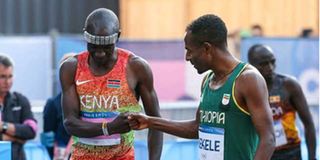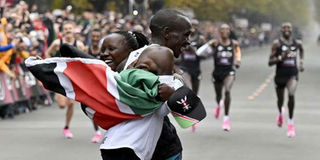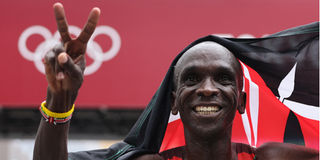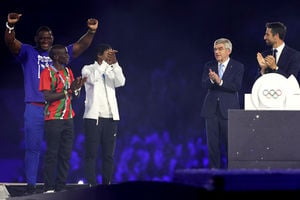
A caricature of Eliud Kipchoge.
If there’s one enduring, archetypal Kenyan trait, it’s the urge to hype up our sporting heroes and then give them a damn good shoeing when they don’t deliver.
We might not be world-beaters at football, but, when it comes to pathetic armchair trolling, we’re peerless. In this respect, the story of Eliud Kipchoge is a thoroughly fitting case study.

Eliud Kipchoge celebrates as he crosses finish line and make history to become the first human being to run a marathon in under 2 hours during the INEOS 1:59 Challenge at Prater Park, Vienna on October 12, 2019.
When Eliud exploded onto the international scene by setting a world junior record for the 5000m in 2003, we scattered rose petals at his feet. We understood he was the athletics Messiah.
The nation was gripped by his grit, his resilience, his ability to win when we expected him to. We called him the GOAT. King-choge. We chanted his name. We cried for a national monument when he ran the first-ever sub-two marathon in Vienna.

Eliud Kipchoge of Kenya bumps fists with Kenenisa Bekele of Ethiopia before the race.
We were consumed by grief when he finished eighth in London during Covid. We cheered and forecasted his return when he finished sixth in Boston a year later. And we mourned with him once more when he finished 10th in Tokyo in March this year.
After the Tokyo disaster in March, those close to him said he had been affected by the trolling and threats in the aftermath of Kelvin Kiptum’s untimely demise. That he was saving himself for an Olympic gold, and that during his training, his game had come back to him.
No, he isn’t old, they said. His muscles were still coming to attention, his speed was picking up, and his power was increasing by the day. His pace and control were excellent.
And yet.
On Saturday, August 10 in Paris, our worst fears were confirmed. Our King-choge finished last after recording a DNF, the strongest suggestion that he was not in the same body he was in 21 years ago when he broke into the limelight, or even two years ago when he broke the world marathon record.
It is only then, when footage of The Legend panting, bent at the waist and holding his back in surrender in the middle of the course, that most people remembered the facts. That even in previous races since his mighty 1.59 feat in Vienna, he was not running as fast. He was tiring more quickly. He was slower to pick up pace. And even when he finished a race, it was harder on him. It took more effort to do it all.

Eliud Kipchoge celebrates after the INEOS 1:59 Challenge at Prater Park, Vienna on October 12, 2019.
“The Tokyo marathon gave us the right signal that Kenya was set to lose the Olympic gold. No athlete can keep his or her fitness for over five months waiting for an Olympic gold,” says former marathon gold medalist Douglas Wakiihuri.

Two-time Olympic marathon champion Eliud Kipchoge speaks with journalists at Les Invalides, Paris, after failing to finish the Paris 2024 Olympic marathon race on Saturday, August 10.
Truly, one cannot deny the toll age takes on an athlete’s body, no matter how unjust. No one can win against time, no matter who they are.
Eliud looks like a shadow of the GOAT we knew and loved, but that is far from the point. Any athlete who dares to scale the heights Eliud has reached deserves to try whatever he wants to, whether he is capable of it or not. It is his right to have fun. To keep playing. To rake in more endorsements. And we should all be glad he is exercising it.
Yet one question continues to linger, isn’t it enough? More accurately, is it time to retire?
“[Competitive] running ends at the Olympics, Commonwealth Games, and World Championships, and the reward is world records. If you have cleared these, it means you have nothing else to work on except the upcoming runners,” Wakiihuri says.
Well, many have been quick to forget what Eliud has done for marathon running. He set the bar for many of the things we now take for granted – incredibly fast marathons, world records, and memorable quotes.
And now, in his moment of defeat, we have all forgotten the most exquisite thing he brought to the sport: The grace of the game. Each strategy is executed to perfection, and every sprint to the finish line is as gritty as it should be.
“He has never behaved like your typical Kenyan athlete. He is very regimented and that didn’t win him many friends. He doesn't do handouts or showmanship like most athletes of yore, but he knows what it takes to be a global star. Eliud is perhaps the only athlete who can hold a conversation with Lewis Hamilton or a CEO and not feel out of place. Because that is how he sees himself. Extraordinary,” opines renowned athletics pundit James Wokabi.

Kenya's Eliud Kipchoge during the unveiling of the new Nike running kit on April 11, 2024.
So we join Eliud in mourning his loss. And yet, we cannot deny that the tide has turned. Eliud Kipchoge is the past, but who is the future?
Well, the future is resting in peace six feet under, in the shape of Kelvin Kiptum, a man who broke our hearts when he perished in a car accident in February this year. The pain is still fresh, so the less said about Kiptum the better.
“Here is the thing, marathon running in Kenya is the gift that keeps on giving. There will always be upcoming athletes. Out of those, some will have a short career while some will go on to be dominant figures. New stars will definitely be born and made,” said Lynn Wachira, Team Kenya’s press attaché at the 2024 Paris Olympics.

Eliud Kipchoge during the INEOS 1:59 Challenge at Prater Park in Vienna, Austria on October 12, 2019.
Back to Eliud. The man has made no secret that he is out to test the limits of humanity, so it must have made the cut that much deeper when he had to be carried to the finish line in a taxi in his latest race. Where he was chasing a third consecutive Olympic gold, he ended up turning away from the finish line. Why won’t he retire?
“I don’t consider myself a retired athlete but a recreational runner since I run every day, and I am happy to welcome Mr Eliud Kipchoge to join me and keep running. Eliud has changed over time and the time has come for him to be changed,” says Wakiihuri, who won gold in the marathon at the 1987 World Championships in Athletics in Rome.

Double Olympic marathon champion Eliud Kipchoge during a training session in Kaptagat this year. He will compete at the Tokyo Marathon next March.
When Kiptum broke Eliud’s record in October last year and Eliud refused to congratulate him, it had the unexpected effect of turning Eliud into a foe almost instantly.
And after the unfortunate trolling he underwent following the 24-year-old’s death, Eliud went from being universally liked, tolerated perhaps, to being loathed especially by his countrymen. From then on, he knew he had to get used to being disliked. But nothing prepares you for finishing last and being asked questions like, “How much time do you think you still have?”
“Eliud has done everything. He is a great marathon runner. He proved it when he ran under two hours. However, the Olympic spirit is to finish [a race]. He is well aware of his condition and injuries don’t just appear during the race. Instead of wasting the space, a young and upcoming marathon runner would have [gone to the Olympics and] gained exposure to hopefully compete in 2028,” a resolute Wakiihuri says.
Think about it. Imagine being a global star, always confident heading into a race, only to be clobbered once you are up against younger, more agile protégés, and being unable to get back up no matter how hard you work. The thought alone is enough to knock the wind out of anyone.

Eliud Kipchoge celebrates with his wife Grace Sugut after he busted the mythical two-hour barrier for the marathon during the "Ineos 1:59 Challenge: Sub-Two Marathon Attempt" on October 12, 2019 in Vienna.
Eliud is now showing us exactly what 21 years of road running does to the human body, but perhaps we should focus more on what that much time living as a supernatural athlete has done to his brain.
“This is the first time we have seen Eliud shedding tears in public. Eliud, who rarely shows any emotion whether winning or losing. Check his messaging after his horrible race in Paris. He gave out his entire kit, went through the mixed zone, did all the interviews, and spoke candidly about his performance., For once he is being more open about his life, and his challenges. That he has been present in all Team Kenya celebrations post Paris is also an indication of someone who is at peace with himself and what happened in France,” says Wokabi.
“I would say that his mindset is perfect, it’s different from Tokyo early this year where he was in mental anguish. This time he quickly accepted that his body just didn’t cooperate. It was more physical than mental. He drew positives from the support of the fans who cheered him along the route after he dropped out. Having Bekele there was a full circle moment for him and he is glad to have experienced the moment. I think being picked by the IOC to represent Africa at the closing ceremony also gave him a good mental boost,” Wachira says, who works closely with Eliud as a consultant for Global, the agency that manages him.
When Eliud was named in Team Kenya’s list of marathoners, few were willing to take a bet on him. Everyone competing against him knew he was old. They knew his body was slowing down. The only thing opponents needed to do was pick up pace early and put it beyond his reach. This, they did, and the results are as we received them that gloomy Saturday morning in Paris.

Kenya's Eliud Kipchoge celebrates after winning the men's marathon final during the Tokyo 2020 Olympic Games in Sapporo on August 8, 2021.
By refusing to bow out, is Eliud becoming the loser who has to go out and face a growing list of critics knowing he has been both outsmarted and outplayed? What makes it worse is that he knows, he knows that those who beat him are not better than him. Because of this, the full weight of failure is on him. A legitimate question can then be asked when a player of his status sets this kind of example, who wins?
“I think trolls will always be there, especially online. It is a career for some and no one is immune to it, sometimes it’s not based on anything specific. In terms of his performance, of course, a podium finish would have been an amazing way to bow out. But no matter the result, it doesn’t change how great of a distance runner he is. He is still in an exclusive club of two-time Olympic back-to-back Marathon winners. Most importantly, some so many athletes are inspired and believe they can last longer in the sport with total disregard to ageism,” says Lynn.
If it were simple, we would simply report that Eliud has had a great career. Well done and thanks, Eliud, you have been great. Now let’s move on. But it has been 21 years at the top now, and he is not the best marathoner worldwide right now. The more radical thinkers say he shouldn’t wear another Kenyan singlet ever again. It isn’t that simple.
“For Eliud, it stopped being about just athletics in 2019 when he ran 1:59:40 in Vienna. After that? He became a global star; an icon, an inspiration, a motivational speaker. Someone who impacted the world in a way no Kenyan athlete had ever done before. That's why we all know the ‘No human is limited’ phrase. The only people who remained stuck on his performances were us, Kenyans, who are quick to praise and quick to kill. Listen to him talking, he lights up when talking about real issues; be it family, determination, resilience, environment, leadership..…anything that isn’t athletics. Ask him a question about running and all you get back is short snappy answers,” says Wokabi.

A bronze statue of Eliud Kipchoge that was unveiled at the Nike headquarters in Beaverton, Oregon, USA, on October 26, 2023.
Research shows that for most athletes, at the beginning, it is usually just about winning, and getting better. Pushing boundaries and limits. But at some point in one’s career, you stop thinking about it that way. You let yourself focus entirely on stats and records.
But that had never been the real goal.
Over the last 10 years, Eliud has gone from running for money and fame to shooting TV commercials and billboards, being immortalised in statues across the world, and moving from stage to stage, inspiring humanity to go after their dreams. So many things get in the way of the actual point.
And once he retires, it will likely get worse. With no more competitions lined up, it will be just about marketing brands, charity functions and perhaps running outside marathon majors, in nondescript courses – for money. Then the real athletics will just sort of go. Poof. Gone.
It might be a harsh question, but it must be asked. Is Eliud just one more in a string of desperate celebs who cannot live without the spotlight? Haile Gebrselassie, Rafael Nadal, Wayne Rooney? One would hope that by now he would have moved on to coaching or mentoring or starting a foundation. But no. He’s still on the road. Why?
My hunch? It is because we cannot stop talking about him. Eliud will always be preceded by his record-breaking exploits. Beyond that, the most remarkable thing about him is simply that no Kenyan marathoner has ever been so widely discussed, furiously championed and patiently tolerated.
Above all, there is simply the absence of anyone else to take the brunt. No more mention of Kiptum, but Eliud remains the story because the real story is, he’s still the story. There is a kind of sadness in this, the quiet knowledge that there doesn’t seem to be any heir that is breathing, at least not yet.
The realisation is that without him we could be staring at Kenya’s flatline years as far as marathon running is concerned. Spin it how you like but nobody can say that Eliud went to the Olympics at the expense of someone better. It can’t be Eliud’s fault that no one looks ready to take the baton.
He’s not making the rest of them fail. He just keeps turning up, and perhaps we should marvel at his bravery. His bravado. He is not like us, and that is the machinery of true celebrityhood.

Kenyan marathoner Eliud Kipchoge became the first human to run a marathon in under two hours on October, 12 2019. PHOTO | INEOS 1:59 CHALLENGE
It will pass however it will, and perhaps we need to stop talking about Eliud for now. Nature abhors a vacuum. Even if he goes another 10 years and breaks two more records, a time will come when he will have to allow himself to be levered up out of his seat and led off politely to a pew nearer the back.
He may no longer be the athlete he once was, but is it the length of the impact a runner makes or the level of impact that is most important?







